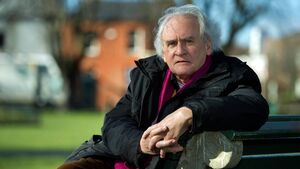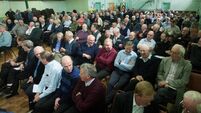Paul Durcan made the mundane magnificent

Paul Durcan was born in Dublin but he was a Mayo man at heart. Picture: Maura Hickey.
We lost a great and wonderful man last week. Paul Durcan was born in Dublin but he was a Mayo man at heart. He was a poet for the ages. More prolific than Kavanagh, less serious than Heaney, Durcan was Ireland’s most entertaining poet. To hear him read his own poetry was to be transported, sometimes to heaven, sometimes to hell. He was unpredictable and could lead one into the most crazy mazes and endings.
He was, of course, of Mayo people. His father, Judge John Durcan was from Castlebar, his mother was connected to Major John McBride, who, of course, married Maud Gonne. There was no love lost between the mother of the Durcans and Maud Gonne who “betrayed uncle John”.
In the poem , a young “walking, talking little boy” was brought by his mother to visit his bed-ridden grand-aunt, Maud. It was a fraught meeting:
Later in the poem, while he might have expected his mother to chastise him, he writes:
Searing stuff from a poet who could be hard as steel and soft as wool.
As seen in his poetry, Paul Durcan’s relationship with his father, the Circuit Court Judge, was difficult. John Durcan was your archetypical stereotype judge. Severe face, hooked nose, tight, closed lips, stern and forbidding. He stayed alone and aloof from the people who did business in his court. He was nicknamed “the adjourning judge”. He was cautious to a fault. He took his time making decisions and rarely got them wrong.
In , leaving behind “the alien foreign city of Dublin,” the five-year-old boy poet urged his father:
How could Dublin lay claim to such a man? And don’t mention :
He was a haycarrier, as was his father and mother and brother and sister and wife and their children. They were always haycarriers and will always be haycarriers until the culmination into those two great final lines:
Achhhhhh he was a grand man. No, he didn’t fall off the train going to Sligo, thinking he was going to the lavatory, but Durcan did spend time in Grangegorman and his father came to observe his son playing against Mullingar Psychiastrict Hospital. The son wished to impress the father.
Grangegorman, on the basis of some wonderful goalkeeping, won by a cricket score, earning the poet a handshake and the sniffing approval “Well played, son”. While he had not been mesmeric, neither had he been mediocre. In his father’s eyes, he had “achieved something at last".
Then, there he was hopping around Knock in the rain with his broken leg as his aunt Sarah proved that while it was good to know God, it was better to get the ear of his mother.
There was no miracle. The trick did not work. But that is scarcely the point:
He was prolific, by times profane and preposterous, backside to the wind. He analysed the Mayo accent:
These are just some of the Mayo stuff in Durcan’s voluminous bank of poetry. There are plenty of other poems that delight, entertain and mystify. Dublin, of course, gets a look in at . Alice Gunn was a cleaner woman down at Government Buildings, who never “touched sherry on a Saturday night” and she had her friends in stitches telling them:
Durcan was a prodigious poet. This is just the tip of the iceberg and fails miserably to do him justice.
I had the great good fortune once to hear Durcan read some of his poems. It was in the church of St Thomas in Dugort, Achill. I was, as usual, at the back of the church but when Durcan whispered, as was sometimes required, depending on the poem, his voice carried and kept his audience transfixed. He made the mundane magnificent. When reciting his work, he was, quite simply, mesmeric. He held his audience in the palm of his hand. And, nothing adorned his poetry like his reading of it.





